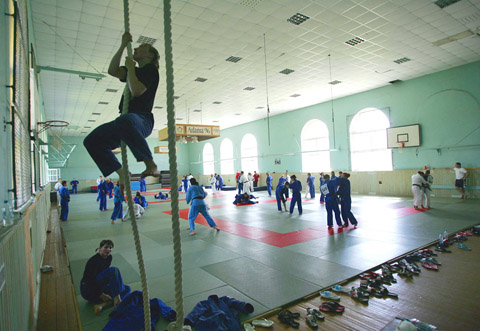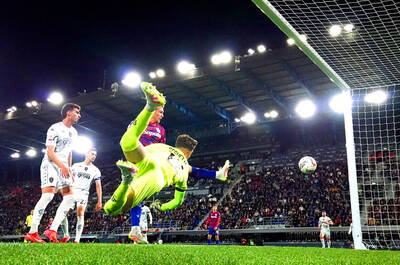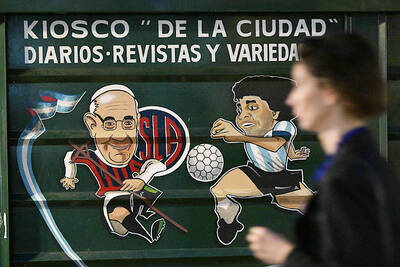FEATURE: The Podolsk Olympic training center located outside Moscow was built more than a half century ago to develop the athletes who would transform the Soviet Union into an athletic superpower.
Today, the red rubber track is well-worn and the paint peeling. The newest structure, a dormitory, was built in 1986, and the medical center is housed in the crumbling former country home of a czarist-era baker.
The Russian athletes heading to the Beijing Olympics in a couple of weeks may be the last to train among the cracked facades of Soviet-era complexes like Podolsk. Hundreds of sleek athletic facilities are springing up everywhere, it seems, heralding an athletics boom in a country hungry for sporting prestige and wallowing in cash.

PHOTO: NY TIMES NEWS SERVICE
Fears of losing Olympic ascendancy have impelled Russia to spend the last several years pumping billions of dollars from its oil-swollen coffers into rebuilding an athletics infrastructure left to rot when the Soviet Union crumbled. The investment has already shown impressive results, with Russians attaining international success in arenas beyond the Olympics.
Last September, the national basketball team won the European championship for the first time since the Soviet Union fell in 1991. In May, the national hockey team beat Canada for its first world championship in 15 years and St. Petersburg’s Zenit soccer club won the UEFA Cup championship. Last month, the national soccer team created a frenzy by advancing to the semi-finals at the European championship. In the world tennis rankings, five of the top 10 women are Russian.
At the Beijing Olympics, Russia is expected to contend for supremacy at the top of the medal table — as usual.
Vyacheslav Fetisov, the former National Hockey League star, is the head of Rossport, the government agency charged with overseeing Russia’s athletic development. He said his budget for building up the country’s athletic infrastructure had soared from a couple hundred thousand dollars when his agency was created in 2002 to US$1 billion today.
The government plans to build 4,000 new athletic facilities in the coming years, including pools, gymnastics halls, and stadiums for soccer and hockey, Fetisov said. About 300 facilities were built last year, and another 400 are scheduled for completion this year.
As heir to the Soviet Union’s legacy of Olympic domination, Russia maintained a steadfast foothold on the Olympic summit through the Soviet collapse and the subsequent economic and social chaos. Until the Athens Games in 2004, it had finished first or second in the gold medal count in the Summer Games, although it faltered somewhat in the Winter Olympics.

Bologna on Thursday advanced past Empoli to reach their first Coppa Italia final in more than half a century. Thijs Dallinga’s 87th-minute header earned Bologna a 2-1 win and his side advanced 5-1 on aggregate. Giovanni Fabbian opened the scoring for Bologna with a header seven minutes in. Then Viktor Kovalenko equalized for Empoli in the 30th minute by turning in a rebound to finish off a counterattack. Bologna won the first leg 3-0. In the May 14 final in Rome, Bologna are to face AC Milan, who eliminated city rivals Inter 4-1 on aggregate following a 3-0 win on Wednesday. Bologna last reached the

If the Wild finally break through and win their first playoff series in a decade, Minnesota’s top line likely will be the reason. They were all over the Golden Knights through the first two games of their NHL Western Conference quarter-finals series, which was 1-1 going back to Minnesota for Game 3 today. The Wild tied the series with a 5-2 win on Tuesday. Matt Boldy had three goals and an assist in the first two games, while Kirill Kaprizov produced two goals and three assists. Joel Eriksson Ek, who centers the line, has yet to get on the scoresheet. “I think the biggest

From a commemorative jersey to a stadium in his name, Argentine soccer organizers are planning a slew of tributes to their late “Captain” Pope Francis, eulogized as the ultimate team player. Tributes to the Argentine pontiff, a lifelong lover of the game, who died on Monday at the age of 88, have been peppered with soccer metaphors in his homeland. “Francisco. What a player,” the Argentine Football Federation (AFA) said, describing the first pope from Latin America and the southern hemisphere as a generational talent who “never hogged the ball” and who showed the world “the importance of having an Argentine captain,

Noelvi Marte on Sunday had seven RBIs and hit his first career grand slam with a drive off infielder Jorge Mateo, while Austin Wynn had a career-high six RBIs as the Cincinnati Reds scored their most runs in 26 years in a 24-2 rout of the Baltimore Orioles. Marte finished with five hits, including his eighth-inning homer off Mateo. Wynn hit a three-run homer in the ninth off catcher Gary Sanchez. Cincinnati scored its most runs since a 24-12 win against the Colorado Rockies on May 19, 1999, and finished with 25 hits. Baltimore allowed its most runs since a 30-3 loss to